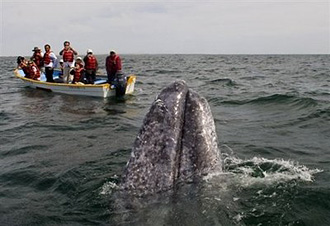
|  |  |  Editorials | Environmental | June 2009 Editorials | Environmental | June 2009  
Cousteau Inspires Mexico's First Marine Observatory
 Agence France-Presse Agence France-Presse
go to original
June 24, 2009


| | People observe a gray whale swimming close to an eco-tourist boat, near the coast of Baja California peninsula. Mexico and France have launched Mexico's first marine observatory on the edge of one of the world's most diverse ocean ecosystems, the Sea of Cortez. (AFP/Luis Acosta) |  |
La Paz, Mexico – Mexico and France have launched Mexico's first marine observatory on the edge of one of the world's most diverse ocean ecosystems, the Sea of Cortez.

The Jacques Cousteau observatory will unite scientific research on the environmental impact from humans and climate change on Mexico's coastlines, and aims to improve public policy to protect them, French and Mexican officials said.

Its first base is housed by the Center of Scientific Research of the Northwest (CIBNOR) in La Paz, on Mexico's northwest Baja California peninsula.

A second is due to open later this year in Merida, in the southeast Yucatan.

Cousteau called Baja California the "world's aquarium" due to the rich marine life off its long coastline in both the Pacific Ocean and the Sea of Cortez.

Its surrounding seas are home to vaquitas or harbor porpoises, whales, dolphins, sea lions and sharks, while its rocky coasts are home to hundreds of resident and migratory birds.

The French explorer carried out several expeditions off Mexico.

"We're going to make available to the observatory all the scientific information we gathered during our expeditions," his widow, Francine Cousteau, told AFP.

The observatory grew out of a Mexican plan to name a small island after Cousteau.

Mexican President Felipe Calderon last week approved the new name for the island, while the observatory project has rapidly expanded, with several French research institutes involved, as well as numerous Mexican universities and scientists.

Arid deserts and turquoise seas off Baja California are also home to some of Mexico's most exclusive tourist resorts.

"The peninsula has an enormous development potential so we have to straight away start putting a surveillance system in place," said Renaud Fichez, from the French IRD scientific research institute.

"For now, we're increasing the pressure so politicians will take over."

Patricia Munoz, director of Mexico's National Polytechnic Institute, underlined that long-term environmental protection policies were still lacking.

"There's no continuity between programs, and that's something that can seriously harm the fishing situation and coastal development," Munoz said.

Overfishing is one of the biggest threats in the region.

Politicians, scientists, researchers and non-governmental organizations met for a three-day seminar in La Paz to launch the observatory, including efforts to seek joint funding.

"The biggest hommage we can give to the commander (Cousteau) is certainly to honor his extraordinary past, but it's also to show that we're continuing," said Francine Cousteau. |

 |
|  |



